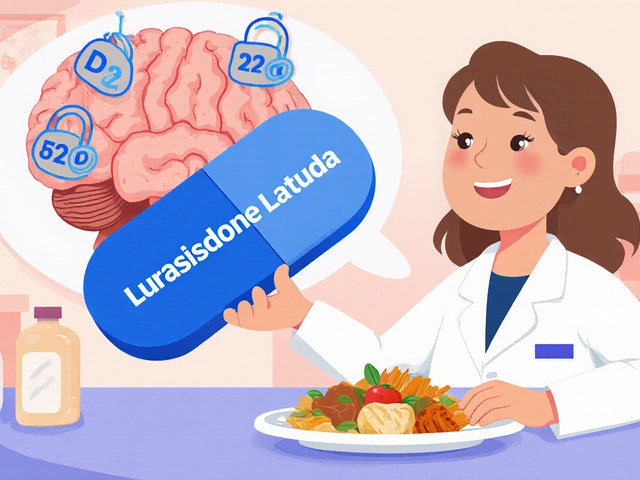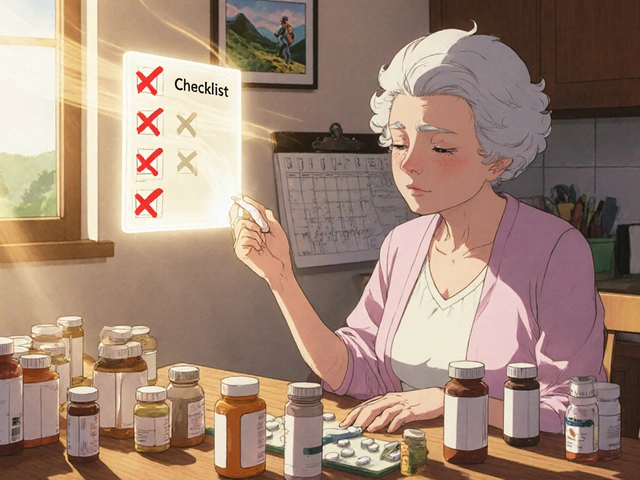Paget's Disease is more than just a physical ailment. It affects the bones, but its impact runs deeper, often touching the very core of one's mental and emotional well-being. Faced with a chronic condition, many individuals find themselves grappling with feelings of isolation, anxiety, and even depression.
The emotional burden of Paget's Disease can often be as debilitating as its physical symptoms. It is crucial to acknowledge and address these challenges to improve the quality of life for those affected. Understanding the disease and finding effective coping mechanisms can aid in alleviating some of the psychological strain.
- What is Paget's Disease?
- Emotional Impact of Living with Paget's Disease
- Mental Health Challenges and Coping Mechanisms
- Support Systems and Resources
- Tips for Managing Mental Health
What is Paget's Disease?
Paget's Disease, medically known as Paget's disease of bone, is a chronic disorder that can result in enlarged and misshapen bones. Unlike other bone conditions, it disrupts the normal cycle of bone renewal, causing old bone to break down faster and abnormal new bone to grow in its place. This new bone is often weaker and larger than normal, leading to complications.
One of the first documented cases of Paget's Disease was identified by Sir James Paget in 1877. While it may not be as well-known as osteoporosis, it's still significantly impactful, mostly affecting adults over the age of 50. The exact cause is unknown, but both genetic and environmental factors are believed to play a role. Some studies suggest that a slow virus infection in bone cells may contribute to the condition.
The symptoms of Paget's Disease can vary. While many people are asymptomatic, meaning they show no visible signs, others experience symptoms that can range from bone pain and deformities to fractures and arthritis in the affected joints. Long bones like the femur, pelvis, lower spine, and skull are frequently involved. Severe cases can even lead to hearing loss and nerve compression.
Diagnosis typically involves a combination of physical examinations, blood tests to check for elevated levels of alkaline phosphatase, and imaging tests such as X-rays, bone scans, or MRIs. These tests help determine the extent of bone involvement and the best course of treatment. It's important to detect the disease early to manage its symptoms and prevent more serious complications.
Paget's Disease affects nearly 1% of adults aged 55 and older, according to the National Institute of Arthritis and Musculoskeletal and Skin Diseases.
Treatment for Paget's Disease usually includes medications known as bisphosphonates, which help to regulate bone turnover. Calcitonin, a hormone that regulates bone metabolism, may also be prescribed. In severe cases, surgical options may be considered to correct bone deformities or fix fractures. Pain relievers and anti-inflammatory drugs can help manage discomfort.
While the physical symptoms of Paget's Disease are often the focus, the mental and emotional toll should not be overlooked. The chronic nature of the disease, combined with physical limitations, can lead to significant emotional and mental health challenges, requiring a holistic approach to patient care.
Emotional Impact of Living with Paget's Disease
Living with Paget's disease brings a heavy emotional toll that often goes overlooked. As a chronic condition affecting the bones, Paget's disease can cause pain, deformities, and fractures. These physical symptoms inevitably lead to feelings of frustration and helplessness.
Patients frequently experience anxiety and worry about their future. The unpredictability of the disease's progression adds to the mental strain. With bones becoming more susceptible to breaks and fractures, everyday activities that were once taken for granted can become a source of fear and anxiety.
Isolation is another significant emotional challenge. People with Paget's disease often feel misunderstood because the condition is not well-known. This lack of awareness can make it challenging to find empathy and support from friends and family, adding to the sense of being alone in their struggle.
"Understanding and empathy from family and friends are crucial. Open communication can ease feelings of isolation," says Dr. Megan Baxter, a specialist in chronic illnesses.
Depression is also common among those living with Paget's disease. The chronic nature of the condition, coupled with the constant pain and limitations on physical activity, can lead to a persistent feeling of sadness. This can make it difficult for patients to find joy in activities they once loved, further compounding their mental health issues.
Coping Mechanisms
Finding effective ways to cope with the emotional impact of Paget's disease is essential. Many patients find solace in joining support groups where they can share their experiences and hear from others facing similar challenges. Engaging in hobbies and activities that are still accessible can also provide a mental break from the disease. For some, speaking with a mental health professional helps to develop strategies for managing anxiety and depression.
Moreover, maintaining a positive outlook, though challenging, is crucial. Small victories, such as managing pain through physical therapy or medication, can be celebrated and used as motivation. Learning about the disease and understanding its progression can also help in reducing anxiety, making patients feel more in control.

Mental Health Challenges and Coping Mechanisms
Living with Paget's disease can take a heavy toll on one’s mental health. The unpredictability of the symptoms, alongside the chronic pain often associated with the condition, can contribute to mental health struggles such as anxiety, depression, and a sense of isolation. Many individuals find themselves feeling out of control and uncertain about their futures, which can exacerbate feelings of helplessness and frustration.
One of the primary mental health challenges is anxiety. Patients often worry about when their symptoms will worsen or whether new complications will arise. This continuous cycle of concern can lead to an overwhelming sense of dread. According to a study published in the Journal of Bone and Mineral Research, nearly 40% of individuals living with chronic conditions like Paget's disease experience significant levels of anxiety.
Depression is another common issue. The constant pain and physical limitations brought on by Paget's disease can lead to feelings of sadness and despair. These emotional struggles can become more pronounced if the individual feels they have lost their previous quality of life. A poignant insight from Dr. Jane Collins, a well-respected expert in the field, highlights this:
"Chronic illnesses like Paget's disease often strip away aspects of a person's identity, making it difficult for them to see past their condition."
Effective Coping Mechanisms
While these challenges are significant, there are effective strategies for managing them. One of the most crucial steps is to seek professional help. Therapists and counselors, especially those with experience in chronic illnesses, can offer valuable tools and techniques to manage anxiety and depression. Cognitive-behavioral therapy (CBT) has proven effective in helping individuals reframe negative thoughts and develop healthier mental habits.
Another vital component is building a robust support system. Connecting with others who understand the daily struggles of living with Paget's disease can provide emotional relief and practical advice. Support groups, whether in-person or online, offer a safe space to share experiences and encouragement.
Additionally, incorporating stress-relief practices into daily life can be beneficial. Activities such as meditation, yoga, and mindfulness can help reduce stress levels and provide a sense of calm. Exercise, where possible, can also improve mood and overall well-being. Even light physical activity, like walking or swimming, can make a substantial difference.
Utilizing Resources
There are numerous resources available specifically for individuals living with Paget's disease. Organizations like the Paget Foundation provide educational materials, support networks, and updates on the latest research and treatments. Leveraging these resources can help patients feel more informed and less isolated.
Finally, effective management of the physical symptoms of Paget's disease can also positively impact mental health. Working closely with healthcare providers to develop a comprehensive treatment plan, which may include medications, physical therapy, and lifestyle changes, is essential. When physical symptoms are controlled, mental health often follows suit.
Addressing the emotional and mental health challenges of living with Paget's disease is an ongoing process. By adopting a multifaceted approach that includes professional support, a solid support system, stress-relief practices, and effective symptom management, individuals can improve their quality of life and navigate the complexities of this chronic condition more effectively.
Support Systems and Resources
Living with Paget's Disease can leave you feeling isolated and overwhelmed. One of the most effective ways to manage these emotional and mental health challenges is through robust support systems and accessible resources. Connecting with others who understand your condition or can offer professional advice can make a world of difference.
Support groups, both in-person and online, are invaluable. They give people a platform to share experiences, offer advice, and provide comfort. Whether it's a local community group or a global network online, finding a space where people know precisely what you're going through can be a significant relief. Specific online forums and social media communities allow for continuous support, ensuring that help is just a message away. For example, the Paget’s Association offers an online forum for people to connect and share their stories.
Professional mental health services are also essential. Speaking with a therapist or counselor who specializes in chronic illnesses can give you coping strategies and emotional support. Cognitive-behavioral therapy (CBT) and other therapeutic approaches can help manage anxiety, depression, and other mental health symptoms that may accompany Paget's Disease. Some hospitals and clinics even offer specialized support groups run by healthcare professionals.
"The emotional side of any chronic condition cannot be underestimated. Engaging with a mental health professional can offer a structured way to navigate the intricate emotions that Paget's Disease might bring," says Dr. Emily Hastings, a clinical psychologist focused on chronic illnesses.
Educational resources are also beneficial. Learning more about Paget's Disease can make it easier to manage the condition. Websites like the National Institutes of Health (NIH) and the Mayo Clinic offer detailed and reliable information on Paget's Disease, from its symptoms to the latest treatments. Knowing what to expect can lessen the emotional burden and empower you to take an active role in your care.
Your family and friends can be another crucial part of your support system. Open communication about what you are experiencing allows them to provide the specific help you need. Whether that’s accompanying you to doctor appointments, helping with daily tasks, or merely offering a listening ear, their involvement can be deeply comforting. Building this network requires courage and openness, but the benefits for your emotional well-being are considerable.
Technology can also be your ally. There are mobile apps designed to help manage chronic conditions by tracking symptoms, medication schedules, and even offering relaxation exercises to reduce stress. These tools can provide a sense of control and organization, relieving some of the mental heavy lifting Paget's might bring.
Lastly, reaching out to organizations dedicated to chronic illnesses can also provide resources and support. These organizations often offer educational materials, hotlines, and even financial assistance programs to help ease the burden of living with a chronic condition. For instance, the Paget's Association provides a helpline staffed by experts who can provide advice and information tailored to your needs.
In sum, leveraging a combination of community support, professional mental health services, educational resources, the backing of loved ones, and technology can significantly alleviate the mental and emotional strain caused by Paget's Disease. By tapping into these resources, you create a multi-faceted support system that empowers you to live a fuller, more emotionally balanced life while managing your condition.

Tips for Managing Mental Health
Living with Paget's Disease can affect emotional well-being, requiring a multifaceted approach to manage the mental health challenges that come with it. One of the most crucial steps is acknowledging that it's okay to seek help and talk about your feelings. Finding ways to manage these emotions can significantly improve quality of life.
It's beneficial to develop a proper understanding of Paget's disease and its impact on your body. This knowledge empowers patients to handle the emotional weight more effectively. Dr. Susan Green, a well-known psychologist who specializes in chronic illnesses, suggests that education can significantly reduce anxiety levels.
"Understanding your illness is the first step to overcoming fear. When people know what to expect, they feel more in control, which can alleviate some of the stress associated with chronic conditions."
Building a Strong Support System
A strong support system plays a vital role. Emotional support from family and friends can be a powerful tool for managing mental health. Simple acts, like having someone to talk to or share experiences with, make a considerable difference. Joining a support group for people with chronic illnesses, either online or in-person, can provide a community of people who understand exactly what you're going through. Shared experiences create a safe space where one can freely talk about their fears and frustrations.
Mindfulness and Stress Reduction Techniques
Practicing mindfulness and stress reduction techniques can be incredibly helpful. Activities such as meditation, yoga, and breathing exercises are proven to decrease stress levels. Consistent practice helps one stay present, reducing anxiety about the future and regret about the past. Guided imagery and progressive relaxation techniques can also be effective in managing stress. It is advisable to integrate these practices into your daily routine for the best results.
Healthy Lifestyle Choices
Maintaining a healthy lifestyle is fundamental. A balanced diet, regular exercise, and adequate sleep can substantially enhance mental health. Exercise releases endorphins, which act as natural mood lifters. However, it is essential to tailor physical activities to your comfort level to avoid aggravating the symptoms of Paget's Disease. Consult with a healthcare provider to create an exercise plan that suits your specific needs. Eating a well-rounded diet rich in nutrients supports overall health, which can positively impact your emotional state.
Professional Mental Health Support
Seeking professional mental health support should never be off the table. Therapists and counselors specializing in chronic illness can offer targeted strategies to cope with emotional turmoil. Cognitive-behavioral therapy (CBT) is particularly effective in changing negative thought patterns. Psychiatrists can also help manage symptoms with medication, if necessary. Always consult healthcare professionals to explore the best options for your situation.
Managing mental health while living with Paget's disease is not just about treating symptoms; it's about creating a comprehensive plan that addresses the emotional and psychological aspects of the condition. By employing these strategies and not shying away from seeking help, individuals with Paget's Disease can lead more fulfilling lives despite their diagnosis.









Comments (12)
Tracy Winn
September 20, 2024 AT 21:13 PMWow, this deep dive into the mental side of Paget's disease really hits the mark, highlighting how chronic pain can snowball into anxiety, depression, and that lingering sense of isolation that many patients describe. The article does a solid job laying out practical coping strategies, from support groups to mindfulness, and it even backs the claims with a few solid citations. It’s refreshing to see a health piece that doesn’t just stop at the bones but widens the lens to the whole person, especially given how often the emotional toll gets brushed aside!
Jessica Wheeler
October 3, 2024 AT 14:46 PMI must say, it’s morally incumbent upon us to acknowledge that the psychological burden of a chronic illness like Paget’s cannot be ignored. The author correctly stresses the importance of professional mental‑health support, which is something many of us forget when we focus solely on the physical symptoms. While the piece is largely precise, there are moments where the prose gets a bit clunky – for example, “definately” appears in the draft, which detracts from its authority. Nonetheless, the overall message is clear and it reminds us that empathy and education go hand‑in‑hand.
Mikayla Blum
October 16, 2024 AT 08:20 AMReading this makes me reflect on how our minds can become the silent battlefield when the body is constantly under stress. It’s kind of like trying to solve a puzzle while the pieces keep shifting – you end up questioning who you are beyond the disease. The suggestions about mindfulness and community support feel especially resonant; I’ve found that even a brief daily meditation can reset the mental chatter. Also, a quick heads‑up: the article uses "its" a lot where "it's" might feel more natural in casual talk :) Keep spreading this balanced view!
Jo D
October 29, 2024 AT 00:53 AMSure, because chronic bone remodeling is exactly the therapeutic frontier for existential dread.
Sinead McArdle
November 10, 2024 AT 18:26 PMI appreciate the thoroughness of this post; it presents the information clearly while maintaining a respectful tone.
Katherine Krucker Merkle
November 23, 2024 AT 12:00 PMGreat rundown! I especially liked the part about using simple breathing exercises to calm the mind. It’s amazing how something so small can have a big impact on overall wellbeing. Also, the reminder to stay connected with friends and family really hits home – nobody should have to go through this alone. Thank you for compiling these resources in one place.
Mark Quintana
December 6, 2024 AT 05:33 AMInteresting points here. I think it’s vital to remember that each patient’s journey is uniqe, and what works for one might not work for another. The emphasis on therapy and support groups is spot on, though I’d add that regular check‑ins with a primary care doc can help catch any changes early. It’s all about a multi‑pronged approach.
Brandon Cassidy
December 18, 2024 AT 23:06 PMLiving with Paget's disease forces a reevaluation of what resilience truly means. First, acknowledging the chronic nature of the condition is essential; it sets the stage for realistic expectations. Second, integrating mental health strategies into daily routines can dramatically improve quality of life. Third, fostering a support network, whether online or in‑person, reduces the feeling of isolation that often accompanies rare illnesses. Fourth, education about the disease empowers patients, diminishing the fear of the unknown. Fifth, regular communication with healthcare providers ensures that treatment plans remain dynamic and responsive. Sixth, mindfulness practices such as meditation or gentle yoga can anchor the mind during flare‑ups. Seventh, simple physical activity, tailored to individual limits, releases endorphins that lift mood. Eighth, journaling thoughts and symptoms creates a tangible record for both patient and doctor. Ninth, setting small, achievable goals provides a sense of progress and combats depression. Tenth, embracing humor, when appropriate, can diffuse tension and foster a more positive outlook. Eleventh, seeking professional mental‑health support, especially therapists experienced with chronic illness, offers structured coping tools. Twelfth, cultivating hobbies that are still accessible preserves identity beyond the disease. Thirteenth, participating in advocacy or patient‑education initiatives can transform personal struggle into collective empowerment. Fourteenth, being kind to oneself, recognizing that setbacks are part of the journey, prevents harsh self‑criticism. Finally, remembering that every day lived, despite pain, is an act of courage, reinforces the intrinsic worth of each individual.
Taylor Yokum
December 31, 2024 AT 16:40 PMThanks for laying this out in a clear way. The tips about mindfulness and staying active are especially helpful for folks who might feel stuck. If anyone needs a quick resource, the Paget Foundation’s website has great forums and a helpline that’s easy to call. Keep the conversation going – sharing experiences can make a world of difference.
Taryn Esses
January 13, 2025 AT 10:13 AMThis is a solid overview; the suggestions are practical and easy to follow.
Albert Lopez
January 26, 2025 AT 03:46 AMWhile the article covers many bases, it borders on superficiality by merely glancing over the nuanced psychodynamic factors that intertwine with chronic somatic ailments. The reliance on generic coping mechanisms-mindfulness, support groups-fails to interrogate the underlying socio‑cultural determinants of health anxiety. Moreover, the citation practice appears tokenistic; a robust meta‑analysis would strengthen the claims. A more rigorous exploration would benefit readers seeking depth rather than a checklist.
Halle Redick
February 6, 2025 AT 17:33 PMAppreciate the thoughtful critique! Let’s remember that even simple tools can be life‑changing for many, and sharing them broadens hope. Keep the dialogue positive and inclusive.